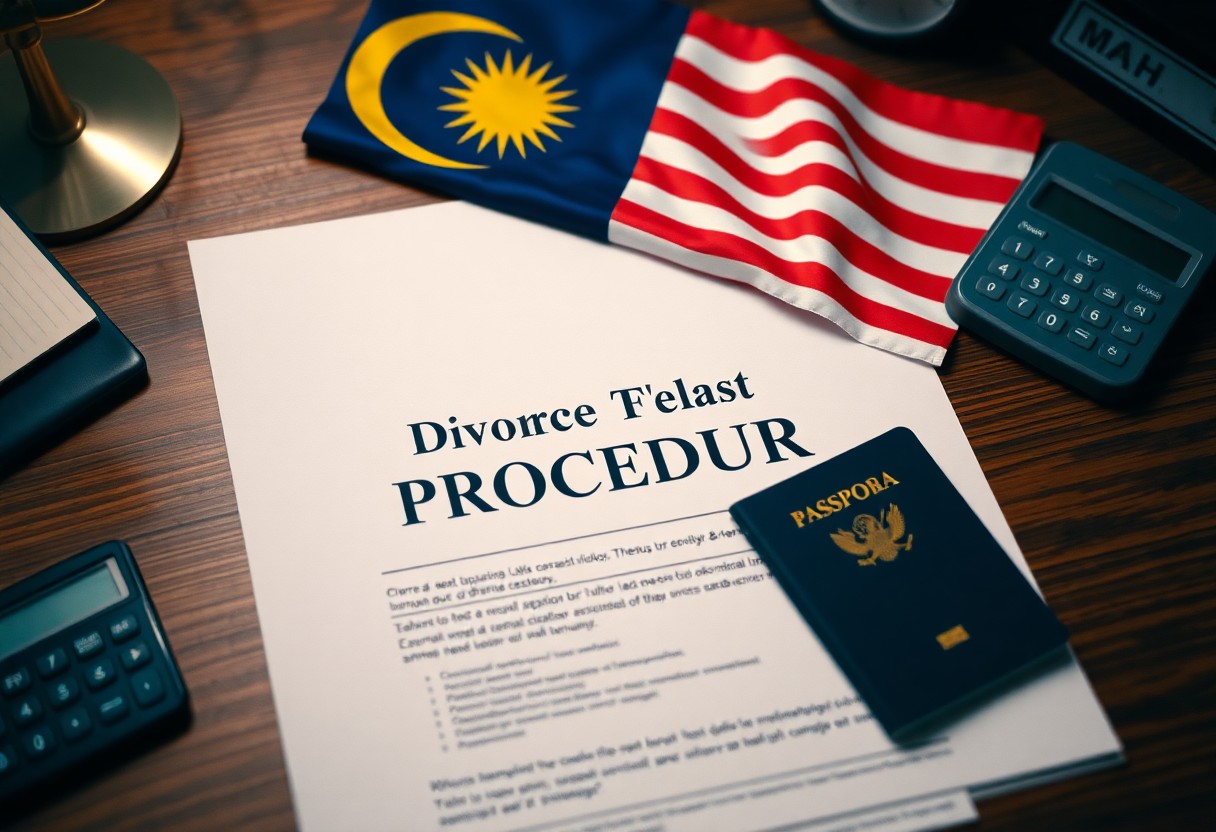Divorce can be a complex process, especially for non-Malaysian citizens married in Malaysia. Understanding the legal requirements and procedures unique to your situation is crucial. You need to navigate through specific documentation, including marriage certificates and divorce petitions, while adhering to local laws. Additionally, be aware of any potential impacts on your assets and custody arrangements, which can differ significantly compared to other jurisdictions. Equip yourself with the right information to ensure a smoother path through this challenging time.

Key Takeaways:
- Non-Malaysian citizens must file for divorce in Malaysia if married there.
- Requirements include a valid marriage certificate and proof of residency.
- Both parties need to appear in court, unless represented by legal counsel.
- Divorce proceedings may be subject to Malaysian family law or Islamic law, depending on marriage type.
- Custody and asset division will be governed by local laws.
- Foreign citizens should consult with their embassies for additional requirements and support.
- Final decree is issued by the court, formalizing the divorce process.
Dissecting the Legal Framework of Divorce in Malaysia
The legal framework governing divorce in Malaysia is multifaceted, incorporating both civil and Islamic laws. Non-Malaysian citizens navigating this landscape must consider the specific jurisdictions and legal channels available for filing, as well as the potential influence of both spouses’ nationalities on the dissolution process. Understanding the legislative environment, including the Malaysian Law Reform (Marriage and Divorce) Act 1976, will facilitate a smoother divorce experience.
The Laws Governing Non-Malaysian Citizens
Non-Malaysian citizens must abide by Malaysian judicial processes to dissolve their marriages. The applicable laws often involve a combination of the Marriage Act and laws from the country of nationality, particularly regarding asset division and child custody. A thorough understanding of these laws ensures compliance with both local and international legal standards.
Key Considerations for International Marriages
When dealing with international marriages, you must consider the intersection of differing legal frameworks that can impact the divorce process. This includes understanding potential complexities surrounding property rights, jurisdiction, and child custody, which may vary substantially between countries.
International marriages often involve various legal aspects that can complicate divorce proceedings. Each spouse’s nationality and residence can affect where the divorce petition is filed and which laws apply. Furthermore, asset division can also be influenced by the couple’s respective laws, sometimes creating conflicts regarding ownership and distribution. Child custody arrangements further complicate matters, as they must align with the laws of the respective nations, which can differ significantly. Consulting with legal professionals well-versed in international divorce laws is vital for navigating these complexities effectively.
Navigating the Step-by-Step Divorce Process
| Step | Description |
| 1. Filing for Divorce | Prepare necessary documentation and submit a petition to the court. |
| 2. Mediation | Engage in mediation sessions to attempt to settle disputes amicably. |
| 3. Court Hearing | Attend a court hearing where the judge reviews your case. |
| 4. Decree Absolute | Obtain the final decree to officially finalize the divorce. |
Filing for Divorce: Necessary Documentation
Begin the divorce procedure by collecting vital documents such as your valid marriage certificate, identification proof, and financial statements. Additional documents may include proof of residency and any child custody agreements if applicable. Ensuring that all documents are in order simplifies the filing process and increases the likelihood of approval by the court.
Engaging Legal Representation: Choosing the Right Lawyer
Selecting the right lawyer can significantly impact the outcome of your divorce. Look for an attorney with expertise in family law, particularly in handling cases involving non-Malaysian citizens. Investigate their case history, client reviews, and approach to mediation or litigation according to your preferences. Engaging a seasoned lawyer ensures your interests are well-represented throughout the proceedings.
A lawyer with specific experience in international divorce cases is particularly beneficial. They often possess knowledge of the intricacies involved in cross-border legal issues, such as asset division across jurisdictions or cultural considerations that may affect custody arrangements. By prioritizing experience and familiarity with Malaysian law, you position yourself for a smoother, more effective divorce process.

The Role of the Malaysian Courts in Non-Citizen Divorces
The Malaysian courts play a vital role in overseeing divorce proceedings involving non-citizen spouses. They possess the authority to adjudicate these cases based on the applicable laws, ensuring that your rights are protected throughout the process. The courts assess various factors, including residency and the nature of the marriage, to establish their jurisdiction and determine the applicable legal standards for the divorce.
Jurisdiction Issues: Where to File
Filing for divorce in Malaysia may raise jurisdictional challenges depending on your residency status and the location of the marriage. Non-citizens may need to file in a court that supports international cases, often the High Court in the region where you reside or where the marriage took place. Knowing your filing options is imperative to avoid unnecessary complications.
Potential Legal Complications and Delays
Legal complications and delays are common when navigating divorce as a non-citizen in Malaysia. Issues such as asset division, child custody disputes, and differing legal interpretations can significantly extend the timeline. Furthermore, if one spouse is unwilling to cooperate, protracted negotiation and court appearances may become inevitable. Factors like the need to secure translations of documents or hire legal representation familiar with both local and international law can also prolong the process.
For instance, if you’re dealing with cross-border asset distributions or custody arrangements, complexities may arise surrounding which country’s laws apply. Additionally, differences in legal terminology or practices can lead to misunderstandings, necessitating further clarification and possibly leading to additional hearings. As an example, cases involving children may require mediation, further delaying resolution. Being prepared for such intricacies can help you manage your expectations and proceed more effectively.
Custody and Asset Distribution: What You Need to Know
Understanding custody and asset distribution is crucial for navigating a divorce as a non-Malaysian citizen married in Malaysia. Courts focus on the child’s best interests, which may influence custody decisions, and the division of assets can involve intricate legalities, especially when considering international laws and jurisdictions.
Child Custody Considerations for Non-Malaysians
Your child custody arrangements will depend on various factors, including residency, the child’s citizenship status, and the legal frameworks in both Malaysia and your home country. The Malaysian courts prioritize the child’s welfare while also giving weight to both parents’ rights, which might require negotiation and possibly mediation to reach an agreement.
Asset Division Challenges in International Contexts
Dividing assets in an international marriage can become complex, particularly when laws differ between countries. Jurisdictions may clash regarding asset classification, valuation, and enforcement of court orders, potentially leading to disputes over property located abroad.
In cases involving multiple countries, issues such as varying property rights can significantly impact outcomes. For instance, community property rules in one country may conflict with separate property principles in another. Legal support is crucial to navigate these complexities, ensuring that all assets, including overseas investments and properties, are identified and properly valued. Countries may differ in how they recognize foreign divorce decrees; thus, understanding international treaties and bilateral agreements becomes vital in securing your rights and interests during asset division.

Emotional and Practical Aftermath of Divorce
The aftermath of divorce involves complex emotional and practical challenges, particularly for non-Malaysian citizens. Adjusting to a new reality while managing feelings of loss, guilt, or relief can be overwhelming. You may find support systems like therapists or support groups invaluable as you navigate this period. Additionally, practical considerations such as housing, finances, and childcare will require immediate attention. Understanding your rights and obligations in this context is imperative for a smoother transition.
Psychological Impact of Divorce on Non-Citizen Spouses
Divorce often inflicts significant psychological stress on non-citizen spouses, magnifying feelings of isolation and uncertainty. You might grapple with identity issues as your legal status can change, affecting your sense of belonging. Anxiety and depression can be common, especially when dealing with cultural differences and the challenges of staying in a foreign country alone. Seeking therapy or counseling tailored for expatriates can provide vital coping strategies and emotional support during this challenging time.
Relocating Post-Divorce: Legal and Logistical Steps
Relocating after a divorce entails several legal and logistical steps you must consider to ensure a smooth transition. Securing your residency status is one of the first priorities; this may involve obtaining a visa extension or returning to your home country. You’ll need to organize your financial matters—closing joint accounts and updating your tax status. Additionally, creating a detailed moving plan, including the coordination of logistics with international movers, can significantly ease the process.
Pay special attention to residency permits and visa requirements based on your nationality and current status in Malaysia. You must initiate communication with the relevant authorities to avoid any legal complications regarding your stay. If you’re considering relocating to your home country, gather imperative documents such as marriage and divorce certificates, identification, and financial records. Moreover, familiarize yourself with your home country’s laws regarding returning citizens. This preparation helps ensure a seamless transition and minimizes disruptions in your life post-divorce.
Summing up
Taking this into account, understanding the divorce procedure for non-Malaysian citizens married in Malaysia is necessary for navigating your unique circumstances. You must engage with local laws, potentially consult legal professionals, and gather necessary documentation to ensure compliance with Malaysian regulations. Be aware of the implications of jurisdiction and consider issues related to asset division and child custody if applicable. By following the appropriate steps and seeking guidance, you can effectively manage your divorce process within Malaysia’s legal framework.
FAQ
Q: Can a non-Malaysian citizen file for divorce in Malaysia?
A: Yes, a non-Malaysian citizen can file for divorce in Malaysia if married under Malaysian law. Residency requirements and specific conditions may apply.
Q: What are the grounds for divorce for non-Malaysian citizens in Malaysia?
A: Grounds for divorce include irretrievable breakdown of marriage, adultery, abandonment, or unreasonable behavior. Specific evidence may be required for each ground.
Q: Is there a mandatory separation period before filing for divorce?
A: Yes, a separation period of at least two years may be required before filing for a divorce petition, unless it is based on specific grounds like adultery.
Q: What documents are needed to file for divorce?
A: Required documents typically include the marriage certificate, identification documents, proof of residency, and any relevant evidence supporting the grounds for divorce.
Q: How is child custody determined during divorce proceedings?
A: Child custody is determined based on the best interests of the child, considering factors like parental fitness, emotional ties, and the child’s wishes if they are of appropriate age.
Q: Can non-Malaysian citizens seek spousal support after divorce?
A: Yes, non-Malaysian citizens can seek spousal support, which may be granted based on the marriage duration and financial needs of the requesting party.
Q: Are there specific legal representatives required for non-Malaysian citizens during divorce?
A: While not mandatory, it is advisable for non-Malaysian citizens to engage legal representation familiar with Malaysian divorce laws to navigate the process effectively.
